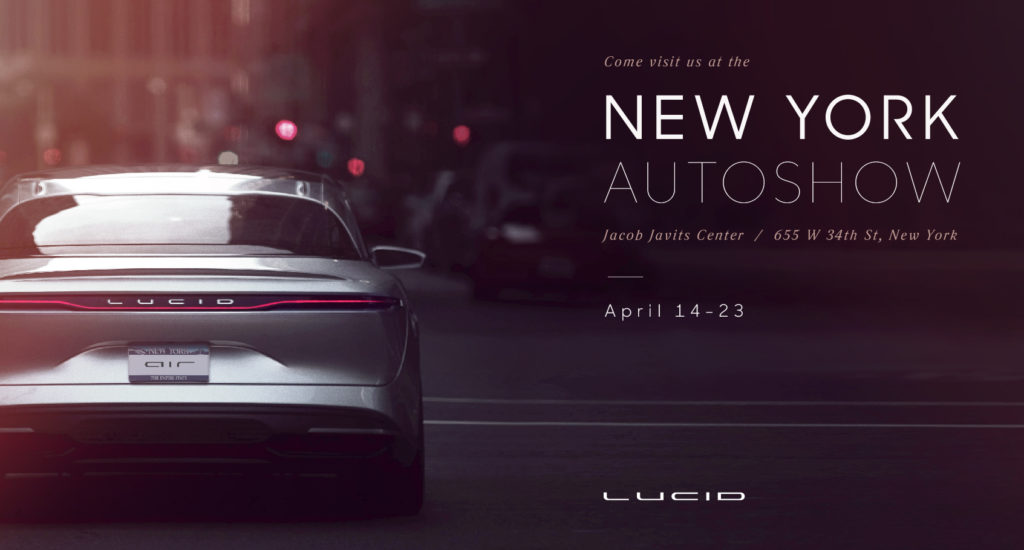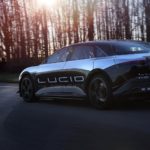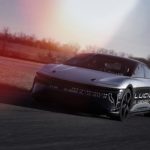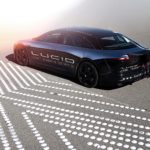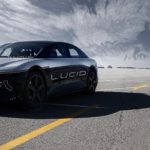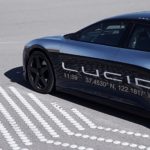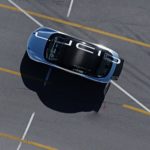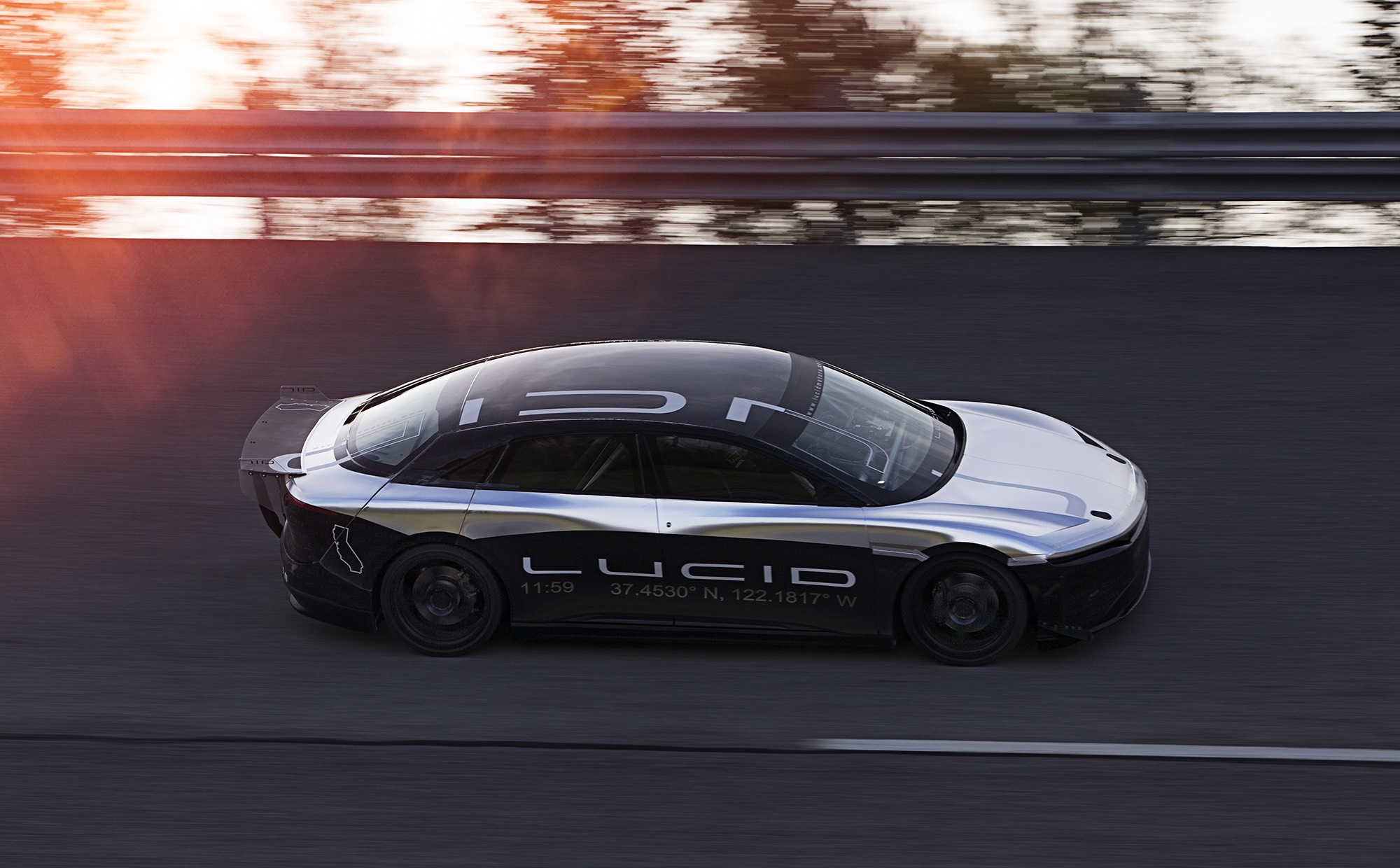
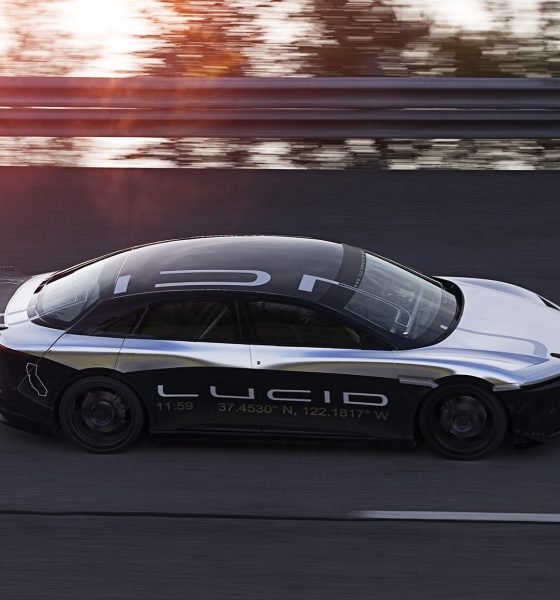
News
All-electric Lucid Motors ‘Air’ reaches 217 mph in high speed stability test
Making a grand entrance at the 117th-annual New York International Auto Show today is electric car startup Lucid Motors. The California-based maker of the “private jet on wheels” is debuting its ultra luxury Lucid ‘Air’ along with its Alpha Speed Car, which recently completed its first high-speed stability test at a software limited 217 mph (350km/h).
The fully autonomous capable Lucid Air represents a new take on luxury vehicles, packing in amenities often found in private jets and boasts expansive space with an exterior footprint of a mid-sized car. On paper, the Air may seem like a direct competitor with current Silicon Valley sweetheart, Tesla’s Model S. However, one can argue that the Lucid Air – with its Maybach quality interior and unprecedented performance – is better equipped to stand in a class of its own. The Air will ship with autonomous ready hardware, and when paired with the distinct focus on passenger comfort and luxury, the all electric powertrain that’s capable of 400 miles of range and 1,000 horsepower starts feeling like a different kind of experience altogether. Impressively, the luxury of the Air will start at just $52,500 after federal tax credits, which is a sizable savings from the costlier Tesla Model S.
ALSO SEE: Tesla Model S vs. Lucid Air: comparison of range, performance and price
Lucid Motors is raising capital to build out the first phase of manufacturing from its upcoming plant in Casa Grande, Arizona. The $700 million factory is expected to begin production on the Lucid Air in 2019 and produce 10,000 vehicles within the first 12 months. Lucid Motors revealed through today’s press release that the factory will reach full capacity in 2022 and produce 130,000 vehicles annually.
The company also announced through the press release that it has begun high speed testing of an Alpha prototype of the Air.
“In preparation for production, Lucid Air Alpha prototypes are undergoing a rigorous development program. Lucid has designated one of these test prototypes as a high-performance test vehicle and has installed a roll-cage for safety purposes. The Alpha Speed Car will be used for evaluating at-the-limit performance.”
Lucid completed the high speed stability on a 7.5 mile oval race track at the independent automotive testing ground TRC Ohio. The vehicle was able to successfully complete the stability and high speed testing at a staggering 217mph (350km/h).
Here are some amazing photos captured during the high speed run.
Unlike Tesla which produces lithium ion battery cells with partner Panasonic, Lucid has locked in an exclusive battery deal with Samsung SDI and will utilize “next-generation cylindrical cells that are able to exceed current performance benchmarks in areas such as energy density, power, calendar life and safety”, according to an announcement made by the company.
Results from Lucid’s 217 mph high speed testing would indicate that the company may have developed a sophisticated battery thermal management system that allows the battery pack to supply maximum output to the vehicle’s high efficiency motor. Lucid Motors Chief Technology Officer Peter Rawlinson has taken his years of experience, previously working at Tesla where he served as Chief Engineer, and rolled that into a battery management system that overcomes thermal limitations faced by Tesla’s system. The Electric GT all-Model S race team experienced some overheating issues after spending time on the racetrack with their Model S:
“The problem is the car has thermal limitations. You can have a very fast car on a qualifying lap, then it goes back to nominal power for 15 or 16 laps…If you save the temperature you can peak it again. The challenge will be to drive as quickly as possible without overheating the motor.”
Only time will tell if Lucid Motors can deliver on its grand vision of the future. If the test drive we took in Los Angeles is any indicator of what’s to come, Lucid Motors is on track to live up to its promises, tenfold.
Lucid Air Makes International Auto Show Debut in New York
Luxury electric sedan completes first high speed stability test at 217 mph
New York, NY, April 13, 2017 – Lucid Motors made its global auto show debut today at the 117th-annual New York International Auto Show. The company showed the Lucid Air luxury electric sedan and also presented its Alpha Speed Car test vehicle, which had just completed its first high-speed stability test at 217 mph.
Lucid Air: Leading the Charge in Luxury Mobility
The Lucid Air was first unveiled in December 2016. The all-electric sedan combines forward- looking design with groundbreaking technology to establish an entirely new class of vehicle. Featuring full-size interior space in a mid-size exterior footprint, the autonomous-ready Air will be available with up to 400 miles of range and 1,000 horsepower.
The Air will be manufactured in Casa Grande, Arizona. The factory, first announced in November 2016, will come online in 2019 and build 10,000 vehicles in the first 12 months. By 2022 the factory is expected to employ 2,000 full-time employees and manufacture up to 130,000 vehicles annually.
The Lucid Air is priced from $52,500 after federal tax credits. The base Lucid Air will feature a 400-horsepower motor, rear-wheel drive, and a 240-mile range. Deliveries will begin in 2019. Customers can pre-order the Air at https://lucidmotors.com/car/reserve.
High Speed Testing: Evaluating Stability and Durability at 217 mph
In preparation for production, Lucid Air Alpha prototypes are undergoing a rigorous development program. Lucid has designated one of these test prototypes as a high-performance test vehicle and has installed a roll-cage for safety purposes. The Alpha Speed Car will be used for evaluating at-the-limit performance.
For the Alpha Speed Car’s first testing session, Lucid headed to TRC Ohio to use their 7.5-mile oval to evaluate high-speed behaviors, including vehicle stability and powertrain thermal management. The test, software-limited to 217mph (350km/h), was successful in demonstrating the capabilities of the car and in finding areas for improvement that could not be properly evaluated in static bench tests.
Real-world tests are an important part of the engineering process, allowing the team to correlate computer simulation models with real-world performance. The collected data will now be used to finesse thermal and aero computer simulations and to make further performance improvements that will be tested later this year at higher speeds.
A video of the test can be seen at https://youtu.be/7k03MH7ztUs.

News
Tesla influencers argue company’s polarizing Full Self-Driving transfer decision
Tesla maintains it will honor transfers for orders with initial delivery windows before the deadline and offers full deposit refunds otherwise, citing longstanding fine print that the program is “subject to change at any time.”
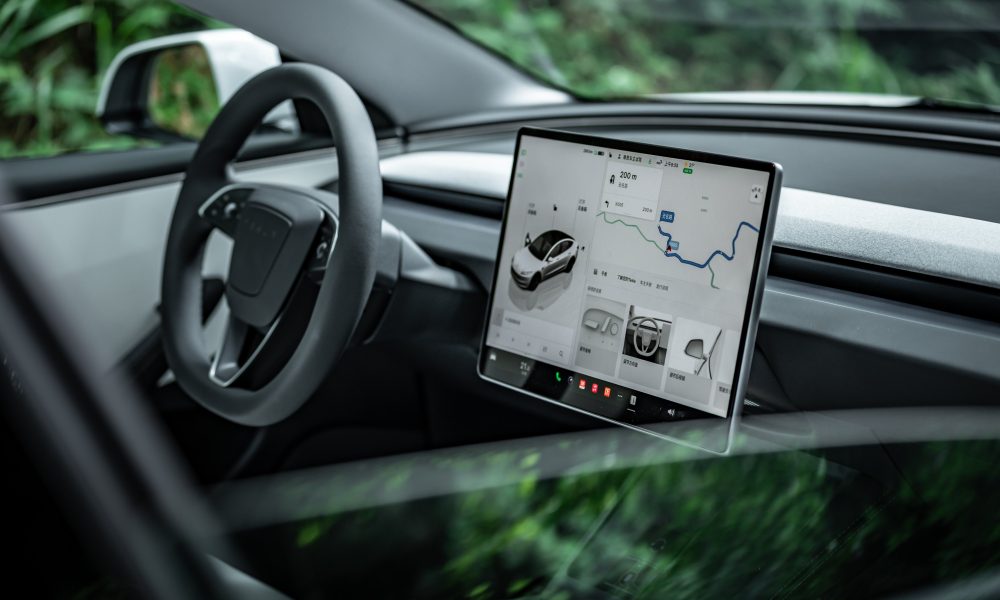
Tesla’s decision to tighten its Full Self-Driving (FSD) transfer promotion has ignited fierce debate among owners and enthusiasts.
The company quietly updated its terms in late February 2026, changing the eligibility from “order by March 31, 2026” to “take delivery by March 31, 2026.”
What began as a flexible incentive to boost sales, allowing buyers to transfer their paid FSD (Supervised) to a new vehicle, now excludes many, particularly Cybertruck owners facing delivery delays into summer or later.
Tesla maintains it will honor transfers for orders with initial delivery windows before the deadline and offers full deposit refunds otherwise, citing longstanding fine print that the program is “subject to change at any time.”
The reversal has polarized the Tesla community, with accusations of a “bait-and-switch” clashing against defenses of corporate pragmatism. Many owners who placed orders under the original wording feel betrayed, especially as production backlogs and new unsupervised FSD rollout complicate timelines.
However, Tesla has allowed them to cancel their orders and receive a refund.
Critics of the decision argue that the change disadvantages loyal customers who helped fund FSD development, calling it poor communication and a revenue grab as Tesla pivots toward subscriptions.
Popular influencers have amplified the divide. Whole Mars Catalog struck a measured but firm tone, acknowledging the original “order by” language but emphasizing Tesla’s right to adjust terms. He has continued to defend Tesla in this particular issue:
Sad to see so many fans trashing Tesla with such extreme language.
LIARS!!! PATHETIC!!! And if you aren’t as furious and angry as they are they are you’re “worshipping” and saying “they can do no wrong”.
Let’s get real here. They’re not liars. They offered FSD transfer to us… https://t.co/3Ay7vGaVR6
— Whole Mars Catalog (@wholemars) March 3, 2026
He criticized extreme backlash as “dramatization” and “spoiled kids,” noting the unsupervised FSD era and broader sales challenges make blanket transfers financially risky. Whole Mars advocated for polite outreach to CEO Elon Musk over the issue.
Rather than “calling them out”, I would simply say “Hey Elon, really hoped to be able to do FSD transfer on my cybertruck but the terms changed. Would really appreciate if Tesla could extend this to everyone who ordered before the terms changes”
that would probably work
— Whole Mars Catalog (@wholemars) March 3, 2026
In a contrasting perspective, Dirty TesLA voiced sharper frustration, posting that blocking transfers feels “crazy” and distancing himself from “people that want to worship a corporation and say they can do no wrong.” His stance resonated with owners who view the policy flip as disrespectful to early adopters.
Popular Tesla influencer Sawyer Merritt captured the frustration felt by thousands. In a widely shared thread viewed over 700,000 times, Merritt detailed how pre-change Cybertruck orders now risk losing FSD eligibility unless their initial delivery window falls before March 31.
It’s not a contradiction, it’s a change in policy that Tesla just made an hour ago. I am trying to check if the change is retroactive to all existing orders, including Cybertruck AWD orders, because if it is, that sucks big time.
— Sawyer Merritt (@SawyerMerritt) February 28, 2026
The controversy underscores deeper tensions—between Tesla’s need for revenue discipline and owners’ expectations of goodwill. As FSD evolves toward unsupervised capability, the community remains split: some see the change as necessary business, others as a broken promise. Whether Tesla reconsiders under pressure or holds firm remains to be seen, but it does not appear they are planning to budge.
News
Tesla Semi’s latest adoptee will likely encourage more of the same
Public visibility matters. When shoppers see a trusted name like Ralph’s running clean, high-tech trucks on public roads, skepticism fades. Competitors such as Albertsons, which pre-ordered Semis years ago, and other chains chasing ESG targets now have proof that electric autonomy works in real-world grocery fleets.
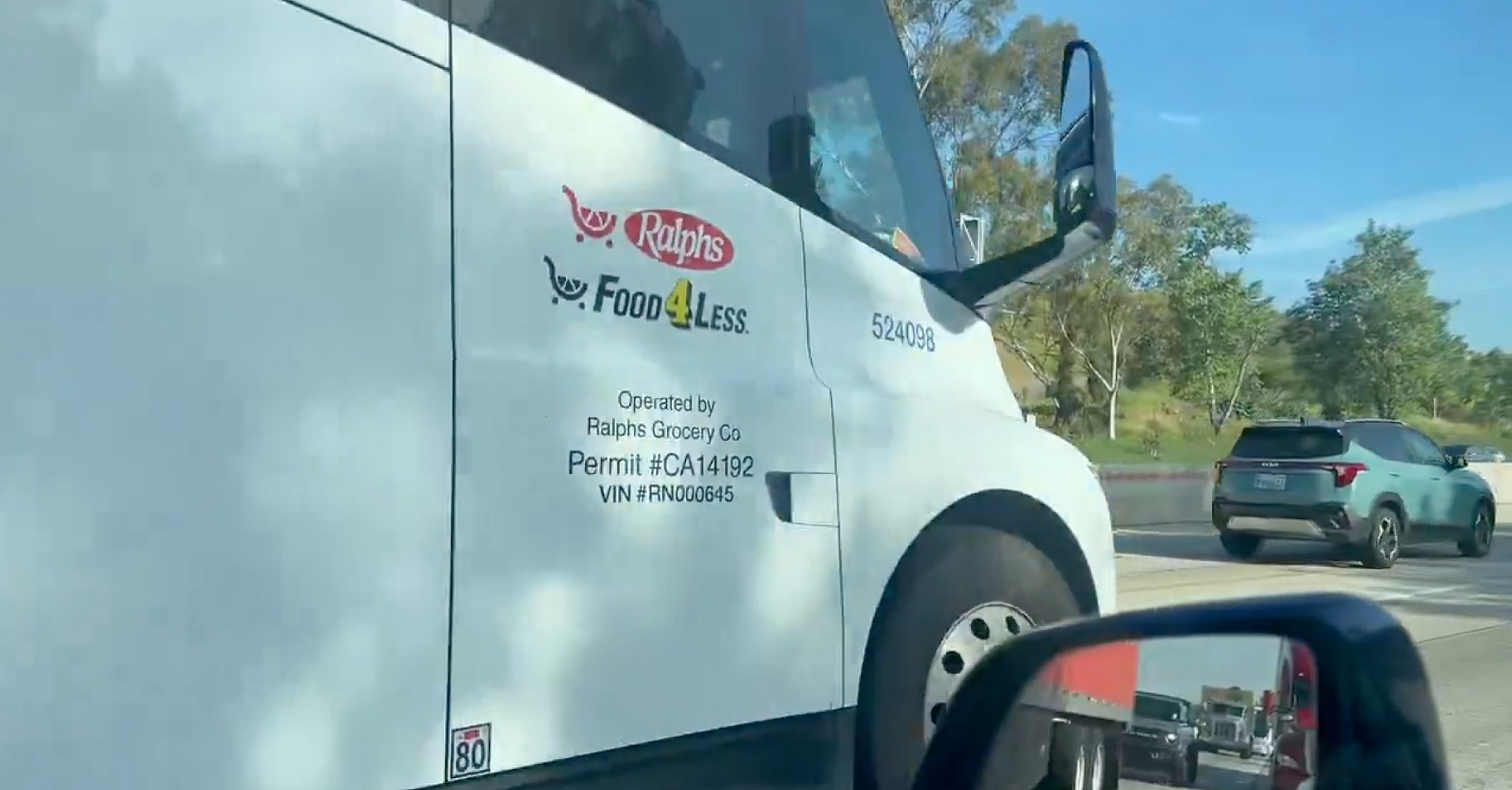
The latest adoptee of the Tesla Semi will likely encourage more businesses in the same realm to adopt the all-electric Class 8 truck, as a new company utilizing the Semi has been spotted in Southern California.
A sleek, futuristic Tesla Semi truck branded for Ralph’s Supermarkets was spotted cruising a Los Angeles highway in a viral 13-second dashcam video posted March 2, by X user ChargePozitive.
Tesla Semi Truck in the wild pic.twitter.com/SnQY8ShMMJ
— ChargePozitive ⚡️➕ (@ChargePozitive) March 2, 2026
This sighting confirms Kroger’s March 2025 partnership with Tesla to deploy up to 500 autonomous electric Semis.
While the initial announcement targeted Midwest supply chains, the California appearance under the Ralph’s banner shows the program expanding to Kroger’s West Coast operations. Ralph’s, a staple for millions of Southern California shoppers, is now hauling groceries with the Semi, which has zero tailpipe emissions and claims up to 500 miles of range per charge.
Tesla Semi pricing revealed after company uncovers trim levels
The timing could not be better for sustainable logistics. Traditional trucking accounts for a massive share of retail emissions, but Tesla’s Semi slashes fuel and maintenance costs while leveraging full autonomy to ease driver shortages and improve safety.
Tesla’s expanding Megacharger network, including new sites along major freight corridors and partnerships like the recently-announced one with Pilot Travel Centers, is removing range anxiety and making nationwide scaling realistic. There’s still a long way to go, but things are moving in the right direction.
Public visibility matters. When shoppers see a trusted name like Ralph’s running clean, high-tech trucks on public roads, skepticism fades. Competitors such as Albertsons, which pre-ordered Semis years ago, and other chains chasing ESG targets now have proof that electric autonomy works in real-world grocery fleets.
PepsiCo’s successful pilots already demonstrated viability, and Ralph’s sighting adds retail credibility.
As Tesla ramps high-volume Semi production through 2026, this isn’t an isolated curiosity. Instead, it’s a catalyst. More grocers adopting the platform will accelerate industry-wide decarbonization, cut operating expenses, and deliver tangible environmental wins.
The future of sustainable supply chains is already on the highway, and Ralph’s just made it impossible to ignore.
Moving forward, Tesla hopes to expand the Semi program into other regions, including Europe, which CEO Elon Musk recently said is a total possibility next year.
Elon Musk
Tesla ramps Cybercab test manufacturing ahead of mass production
Tesla still has plans for volume production, which remains between four and eight weeks away, aligning with Musk’s statements that early ramps would be deliberately measured given the Cybercab’s novel architecture and full reliance on Tesla’s vision-based Full Self-Driving technology.
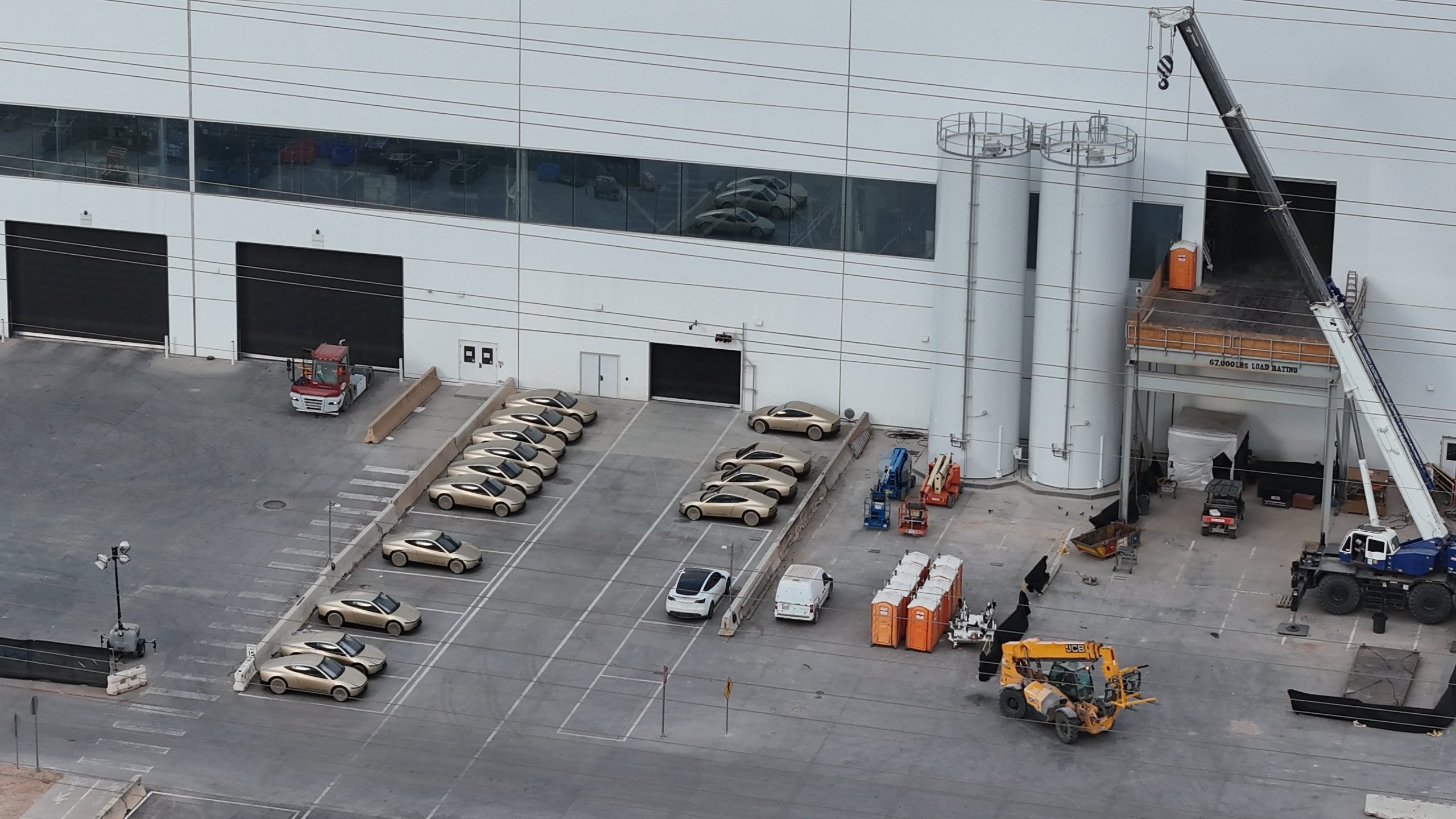
Tesla is seemingly ramping Cybercab test manufacturing ahead of mass production, which is scheduled to begin next month, the company said.
At Tesla’s Gigafactory Texas, production of the Cybercab, the company’s groundbreaking purpose-built Robotaxi vehicle, is accelerating markedly. Drone footage from Joe Tegtmeyer captured striking aerial footage today, revealing what appears to be the largest public sighting of Cyebrcabs to date.
A total of 25 units were observed by Tegtmeyer across the Gigafactory Texas property, marking a clear step-up in testing and validation activities as Tesla prepares for a broader output.
Tesla Cybercab production begins: The end of car ownership as we know it?
In the footage, 14 metallic gold Cybercabs were parked in a tight formation outside the factory exit, showcasing their sleek, autonomous-only design with no steering wheels, pedals, or traditional controls. Another 9 units sat at the crash testing facility, likely undergoing structural and safety validations, while two more appeared at the west end-of-line area for final checks.
Big day for Cybercab at Giga Texas today! Actually, yesterday to kick off March, the production line went into a higher volume & today we see 25 at three main locations, and there were several others I observed driving around too!
I think this may be the largest single grouping… pic.twitter.com/HZDMNv57lJ
— Joe Tegtmeyer 🚀 🤠🛸😎 (@JoeTegtmeyer) March 3, 2026
Tegtmeyer noted additional Cybercabs driving around the complex, hinting at active movement and real-world testing beyond static parking.
This surge follows the first production Cybercab rolling off the line in mid-February 2026, several weeks ahead of the originally anticipated April start.
That milestone, celebrated by Tesla employees and confirmed by CEO Elon Musk, kicked off low-volume builds on the dedicated “unboxed” manufacturing line, a modular process designed to slash costs, reduce factory footprint, and enable faster assembly compared to conventional methods.
Industry observers interpret the jump to dozens of visible units in early March as evidence that Tesla has transitioned into higher-volume test manufacturing.
Tesla still has plans for volume production, which remains between four and eight weeks away, aligning with Musk’s statements that early ramps would be deliberately measured given the Cybercab’s novel architecture and full reliance on Tesla’s vision-based Full Self-Driving technology.
The Cybercab, envisioned as a sub-$30,000 autonomous two-seater for robotaxi fleets, represents Tesla’s bold pivot toward scalable autonomy and robotics.
Tesla fans and enthusiasts on X praised the imagery, with many expressing excitement over the visible progress toward deployment. While challenges remain, including software maturity, regulatory hurdles, and supply chain scaling, the increased factory activity underscores Tesla’s momentum in turning the Cybercab vision into reality.
As Giga Texas continues expanding and refining the manufacturing process of the Cybercab, the coming months will prove to be a pivotal time in determining how quickly this revolutionary vehicle reaches roads in the U.S. and internationally.
